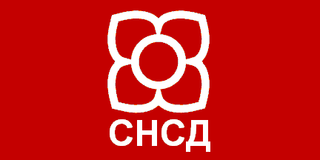The Politics of Bosnia and Herzegovina takes place in a framework of a parliamentary representative democracy, whereby executive power is exercised by the Council of Ministers of Bosnia and Herzegovina. Legislative power is vested in both the Council of Ministers and the Parliamentary Assembly of Bosnia and Herzegovina. Members of the Parliamentary Assembly are chosen according to a proportional representation system.

The House of Representatives, is one of the two chambers of the Parliamentary Assembly of Bosnia and Herzegovina, with the other being the House of Peoples of Bosnia and Herzegovina. The chamber consists of 42 members which are elected by party-list proportional representation. 28 members are elected from the Federation of Bosnia and Herzegovina (FBiH), and 14 from the Republika Srpska (RS). Members serve for terms of four years. The current membership of the chamber was elected on 7 October 2018.

Milorad Dodik is a Bosnian Serb politician, current chairman and Serb member of the tripartite Presidency of Bosnia and Herzegovina. Previously, he had served as the president of Republika Srpska between 2010 and 2018, and as the 6th and 10th Prime Minister of Republika Srpska between 1998 and 2001, and between 2006 and 2010. In the 2018 election Dodik was elected as the Serb Member of the Presidency of Bosnia and Herzegovina, defeating one-term incumbent Mladen Ivanić. Some observers have described his rule as authoritarian and autocratic with a strong nationalist position.

The Alliance of Independent Social Democrats, is a Serb political party in Bosnia and Herzegovina. Founded in 1996, it is the governing party in Republika Srpska, with its leader, Milorad Dodik, serving as the current Serb member of the presidency of Bosnia and Herzegovina.

General elections were held in Bosnia and Herzegovina on 1 October 2006. They decided the makeup of Bosnia and Herzegovina's presidency as well as federal, entity, and cantonal governments. As of September 2006 there were 2,736,886 registered voters. Of the 2.7 million voters, 1.7 millions are in the Federation of Bosnia and Herzegovina and 1 million in Republika Srpska. Official voter turnout as reported by the Central Election Commission was 52.74% of the total number of registered voters.

Željko Komšić is a Bosnian politician who serves as the Croat member of the Presidency of Bosnia and Herzegovina. He served from 2006 until 2014, and he was re-elected to the same office for a third term in the 2018 election, thus becoming the second Presidency member overall and the first Croat member to serve more than two terms. He was sworn in in November 2018, along with fellow Presidency members Šefik Džaferović (Bosniak) and Milorad Dodik (Serb).

General elections were held in Bosnia and Herzegovina on 3 October 2010 for both the Federal government and the two entities.
Following the election on 3 October 2010, a process of formation of Bosnia and Herzegovina's Council of Ministers had begun. The resulting election has produced a fragmented political landscape without a coalition of a parliamentary majority more than a year after the election. The centralist Social Democratic Party of Bosnia and Herzegovina, the largest party in the Federation of Bosnia and Herzegovina and the Bosnian Serb autonomist Alliance of Independent Social Democrats, the largest party in the Republika Srpska, each have 8 MPs of the total 42 MPs of the House of Representatives. Similarly, a crisis of government is also present at the local levels, as well as the Federal entity.
The Civic Democratic Party is a political party in Bosnia and Herzegovina.
The Muslim Bosniak Organisation was a political party in Bosnia and Herzegovina.
The People's Alliance for Free Peace was a political alliance in Bosnia and Herzegovina.
The Union of Social Democrats of Bosnia and Herzegovina was a political party in Bosnia and Herzegovina.
The Republican Party was a political party in Bosnia and Herzegovina. It adopted a secular policy but did not win support from many Bosniaks.
The Radical Party of Republika Srpska was a political party in the Republika Srpska area of Bosnia and Herzegovina.
The Democratic Socialist Party was a political party in the Republika Srpska part of Bosnia and Herzegovina.

General elections were held in Bosnia and Herzegovina on 12 October 2014. Voters elected the national Presidency and House of Representatives, as well as the Presidents and legislatures of the two entities.
The Party of Democratic Activity is a conservative political party in Bosnia and Herzegovina.
Homeland (Domovina) was an electoral alliance in Republika Srpska, forming a joint parliamentary group in the National Assembly.









